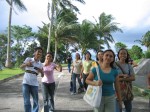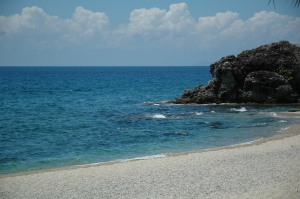LIS 260 Goes To Laguna
26 09 2008Before I started writing this entry, I went over the pictures during the trip. I remembered that I have not found time to upload it in our e-group or even in my blog. For the delay, I would like to apologize. Reviewing the photos makes me smile and it will be rude if I wouldn’t share it with the class. These are proofs that graduate school can be fun contrary to the oh-so-serious stereotype setting that was planted in my brain when I was an undergraduate student. Well I guess it depends on the facilitator of the class. =)
Going back, the ups and the downs of the planning and preparation for the field trip vanished the moment we started arriving one after the other on early morning of 13 September. All were high in spirit, eager beavers, and enjoying a day a way from the pressures of work. I, personally felt like a little kid set out for my first field trip. Right on, our mouth watered for the delicacies we’ll be partaking for lunch, the perfect rambutans, the sweetest lanzones, the famous chocolate cake love potion (wink!), and much more food to our hearts’ content.
I think more than what I have learned from the UP Open University, more than the chatter in the vans as we went our way to Laguna and back, more than the delicious food, what I cherished the most was the photo ops. It’s not because I love posing for the camera (ahem) but because pictures can’t lie. The moments captured in every click of the shutter are the exact manifestation of the moods of the people being photographed. Candid photos even more are ‘pure moments’. Again, why the photo ops? I felt the bonding – I saw it, I lived it (even for just a single day). No one was estranged; the smile was plastered on our faces. The objective was met. =)
One final point of my reflection is reserved on the “suso” and Pook Bathala and their correlation to my life. I didn’t try it, didn’t taste it, and didn’t touch it. It was not really new to me, I saw my late Nanay gobble it like caviar (inappropriate comparison, I know). I missed her when I saw the suso dish, she loved eating this kind of food. I missed her all the more when we got to Pook Bathala. I knew somewhere beneath the clouds, among the fresh air and trees, in the ascending road, there was her permission for me to be where I was that day – same date when she bid me good bye to be part of a destined field trip on her own and never to return again to show me some pictures.
Comments : 1 Comment »
Categories : Uncategorized
LIBRO SYSTEM 2007
26 09 2008I could have chosen our integrated library system, Library.Solutions to evaluate or review but I decided to feature the LIBRO System by Mr. Romeo Sebastian. To be candid, I am not ‘yet’ well-versed on the ILS used neither in the Rizal Library nor with LIBRO. My sister is in-charge of the resource center of the Asian Federation Against Involuntary Disappearances, a non-governmental organization at the Philippine Social Science Center. Her collection is relatively small and she decided to use the LIBRO System. I have to establish that this review is based on her experience with the use of the system.
To point out some advantages:
• The system is inexpensive. The amount to be paid covers the training of the librarian and not the system itself.
• Generally, it is user-friendly.
• One of the most notable aspects is that, the system was developed by a librarian, thus, the utilities included are essentially what a librarian needs.
• As any integrated library system should be, it is comprised of several modules and is capable of shifting from one database to another easily. The system requirement for it to operate is also minimal and does not call for a server to be maintained.
• Data input, record retrieval and report generation are also convenient.
• The interface for the OPAC is simple and user-friendly. This is important because this is on the frontline of the system (in the perspective of the service community).
• The LIBRO System OPAC can also be launched in the Web.
Some concerns on the system:
• There is no provision to check if a certain record is already a duplicate.
• There is a question on what will be the case when there are more than one person doing bibliographic entry/encoding. How will the master file number (MFN) be reconciled?
• With regard to the Web OPAC, the only limitation observed was, the ASP language is not widely used. As a result, there was a difficulty finding a host for the OPAC.
One look at this review would pose that the system has far more strong points than its limitations. A highlighted comment on this system is its developer. My sister mentioned that Mr. Sebastian is such a receptive person and very much willing to share what he knows to pursue his noble advocacy for the Library Science profession.
Hats off, strive on! =)
Comments : 3 Comments »
Categories : Uncategorized
Use of Online and Digital Media : A Critique
25 07 2008READING ASSIGNMENT
Title of the Article : Learning, Teaching, and Researching on the Internet : A Practical Guide for Social Scientists
Author : Stuart D. Stein
Publisher : Addison Wesley Longman
We are inclined to view the Internet as a vast repository of information. There are millions of data files that can be readily accessed: text, graphic, moving images, binary and audio. We are witness to the exponential growth in the volume and range of publicly accessible materials available in the Internet servers. Having said this, my first critique on the use of online media is, no one is in a position to quantify the overall volume of data much more to qualify the information being uploaded. Is there someone in authority who can conduct quality control in the Internet? I guess not… “Garbage in, garbage out”. This could have been more tolerable if every person who would like to contribute is also quality conscious. On the aspect of information retrieval, one has to practice patience and attention to details to aim for optimum research skills.
Second, every second of the day, files are being uploaded, deleted, moved or altered. This now highlights the posterity issue of documents in the online media. We don’t know how long technologies of today would persist, if systems of today can still support what is there in the future. This again has a huge impact on how we can access information if all the repositories are intangible. How can we claim progress in information storage and retrieval if the volatility of sources is looming around us?
These two things are on top of my list. On final note, there are numerous advantages of online media but we can only appreciate their worth if we can see through their flaws. After all, we claim that we live in modern times but this too entails, that we should have a vision of perpetuity.
Comments : Leave a Comment »
Categories : Uncategorized
Reading Assignments
10 07 2008Thank you Ma’am Shy Sharon! =)
Comments : Leave a Comment »
Categories : Uncategorized
TGIF
4 07 2008“To be human is to keep rattling the bars of the cage of existence, hollering,’What’s it for’?”
Robert Fulghum
Comments : 1 Comment »
Categories : Uncategorized


















